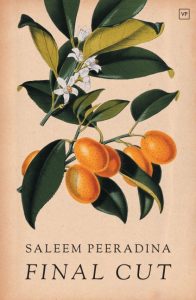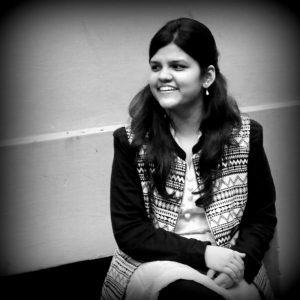Final Cut by Saleem Peeradina
Reviewed by Samreen Sajeda

. . . the family
could hardly afford luxuries like using up five oranges
to fill half a glass of juice.
~ Saleem Peeradina
Final Cut has a charming genesis story in a senior poet’s inability to wander outside like he would earlier, which led to musing on subjects nearer home. And, so, here are a range of poems on household objects strewn across the home with stories of their own, fruits decorating the dining table, or birds flocking over the birdfeed in the poet’s backyard. What beautifully complements these poems is the gorgeous feel of the book; clearly, the publisher has not compromised on quality paper and smooth covers to drape the book.
There is a sensory appeal in the contemplation of the ‘anatomy of a fig,’ or the pomegranate quartered into a bed of ‘rubies,’ or when the poet tells you ‘how to handle a ripe mango should you encounter one.’ The description of the scent of oranges such that ‘an entire orchard has been packed into the single fruit’ arrests your senses as if you yourself are biting into it.
Even more stunning are his set of object poems resembling miniature-autobiographies. Be it the Stapler ‘borrowed’ for keeps! Or the faithful Shaving Brush awaiting its fate at fifty. Not to forget the old-fashioned Juicer waking up on ‘slow Sunday mornings’ to replay a forgotten ritual, just when the aged Grater sportily watches the new one steal the show—unlike the Tava, destined to ‘outlive mortals,’ perhaps like Peeradina’s poetic words.
His poems affirm that imagination has the power to accommodate the universe on a sheet of paper. Not only is Peeradina able to capture still images, he also excels at freezing transient moments like ‘a silent smile in the very next instant, dissolving, fading . . .’ Likewise, he manages to capture the urgency of encountering the beloved in a dream, aware that ‘If I missed you/by a heartbeat, I missed you by a century.’
The poet is not unaware of the illusion of the ‘written’ word. He knows that the contractor cannot be trusted to adhere to ‘the agreement in a timely fashion/whether it is verbal or written down.’ But even more ironic is when he personifies death throughout “Close Call,” because after all, ‘Death was born to steal the show.’ This is just one instance of such splendid surprise lines waiting to greet you at the end of his verses, endorsing the poet’s sheer wit. While most of the poems spread across half a page, a few like “To an Old Friend” and “The Daughter’s Lament” are longer monologues with the fragrance of a short story.
Peeradina’s poems are also a manifestation of other art forms that he engages with as is seen in “Embedded”—an ekphrastic poem on the freshness of strawberries, which the poet will ‘preserve like museum exhibits.’ What is significant is that he refrains from essentializing the voice of the ‘other.’ This is evident when he confesses that his own ‘fingers are strangers to dirt’ unlike those ‘whose limbs have sweated in the fields.’ His older book also preserves poems inspired by paintings making ‘a window on his wall.’ “A Rumor of Birds” is an exceptional piece inspired by a book on migratory birds ‘claiming only a bit of earth and infinite sky.’ This is followed by the poem on crows making ‘a picnic out of a roadside carcass,’ the blue heron striking ‘a ballerina’s pose,’ or the ‘clay-colored’ sparrows. The reader is left gaping at the hummingbird probing the ‘hearts of flowers,’ or the mourning dove avoiding the noisy sparrows, ‘not in disdain but an almost Buddhist aloofness.’
The invisible turns visible when Peeradina makes ‘Something out of nothing’ and the impeccably broken stanzas appeal to the eye. His is surely an art of finesse as even the simplest of things turn graceful under his pen. In the poet’s own words—‘it is not food alone that satisfies the appetite. It is the devotion/with which you have garnished your offering that satiates the hunger.’
![]()

Samreen Sajeda graduated in English literature from Sophia College, Mumbai. She completed an MA in the same discipline from the University of Mumbai. She is, at present, reading for a PhD in Palestinian poetry in translation. She writes poems and short stories. Her work has been published in Muse India, The Bosphorus Review of Books, Guftugu, Indian Cultural Forum, Spark, Hakara, and elsewhere.



